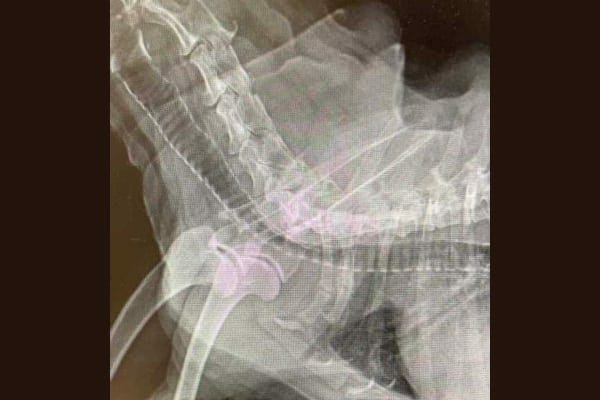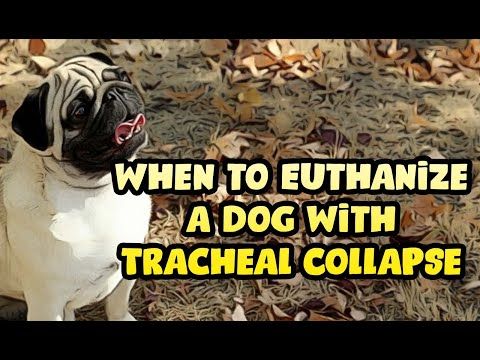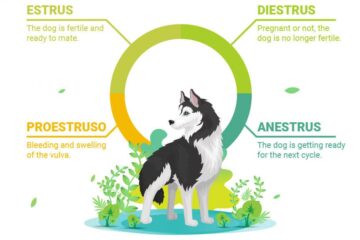When a dog with tracheal collapse fails to respond to treatment and its quality of life is significantly affected, euthanasia may be considered. If the dog is lethargic and unable to perform daily activities, it may be time to say goodbye.
Euthanasia should always be discussed with a veterinarian to ensure it is the best decision for the dog’s well-being. Tracheal collapse is a condition where the cartilage rings in the trachea weaken, causing them to flatten and narrow the airway.
This can lead to respiratory distress and discomfort for the dog. While there are treatment options available, such as cough suppressants and corticosteroids, some dogs may not respond well to these interventions. In cases where the dog’s symptoms persist and their quality of life is greatly compromised, euthanasia may be a compassionate choice to prevent further suffering.
Understanding Tracheal Collapse In Dogs
When a dog with tracheal collapse fails to respond to treatment and the symptoms begin to affect its quality of life, euthanasia may be necessary. If the dog is extremely lethargic and unable to perform daily activities, it may be time to say goodbye.
Understanding Tracheal Collapse in Dogs Tracheal collapse in dogs occurs when the cartilage rings of the trachea weaken, leading to the flattening and narrowing of the airway. This condition is commonly observed in small-breed dogs and is suspected to have a genetic component. The weakening of cartilage can be multifactorial, and understanding the causes and symptoms of tracheal collapse is crucial in determining the appropriate course of action for your beloved pet.
Causes Of Tracheal Collapse
The exact causes of tracheal collapse in dogs are not fully understood, but it is believed to be linked to multiple factors. Genetic predisposition is suspected, as small-breed dogs are predominantly affected by this condition. Other contributing factors may include environmental influences and abnormal tracheal development.
Symptoms Of Tracheal Collapse
Recognizing the symptoms of tracheal collapse in dogs is essential for early intervention. Common signs include chronic or recurrent coughing, respiratory distress, difficulty breathing, exercise intolerance, and in severe cases, cyanosis. Your dog may also exhibit gagging, retching, and abnormal respiratory sounds during breathing. Overall, staying informed about the causes and symptoms of tracheal collapse is crucial for providing the best care for your canine companion. By understanding these factors, you can take proactive measures to manage your dog’s condition and ensure their well-being.

Credit: toegrips.com
Treatment Options For Tracheal Collapse
Treatment Options for Tracheal Collapse
Tracheal collapse in dogs is a serious condition that requires careful management and treatment. With the right approach, it is possible to alleviate the symptoms and improve the dog’s quality of life. Here are some treatment options for managing tracheal collapse that can be considered:
Cough Suppressants
Cough suppressants can help reduce the frequency and severity of coughing in dogs with tracheal collapse. This can help improve the dog’s comfort and reduce airway irritation. However, it’s important to use these medications under the guidance of a veterinarian to ensure the appropriate dosage and monitoring for potential side effects.
Corticosteroids
Corticosteroids can be prescribed to reduce inflammation in the airways, which can provide relief from symptoms such as coughing and breathing difficulties. These medications can help manage the condition and improve the dog’s overall comfort. However, their use should be carefully monitored to minimize potential side effects.
Sedatives And Anxiolytics
Sedatives and anxiolytics may be recommended to help calm and relax the dog, especially during episodes of increased respiratory distress. By reducing anxiety and stress, these medications can help minimize coughing and ease breathing, contributing to the dog’s comfort.
Bronchodilators
Bronchodilators are medications that can help dilate the airways, making it easier for the dog to breathe. These drugs can provide relief from the constriction and narrowing of the trachea, improving the dog’s respiratory function. However, their use should be carefully monitored to ensure effectiveness and safety.
When To Consider Euthanasia For A Dog With Tracheal Collapse
When a dog is diagnosed with tracheal collapse, it is a difficult and heart-wrenching journey for both the dog and the owner. Tracheal collapse is a chronic and progressive condition that affects the trachea or windpipe, making it difficult for the dog to breathe. While there are various treatment options available, there may come a time when euthanasia needs to be considered. This decision should be made with careful consideration and consultation with a veterinarian.
Failure To Respond To Treatment
One important factor to consider when contemplating euthanasia for a dog with tracheal collapse is the failure to respond to treatment. Despite various treatment options such as cough suppressants, corticosteroids, sedatives, and bronchodilators, some dogs may not show significant improvement. It is crucial to give the dog ample time to respond to the treatment plan, but if there is no noticeable improvement over an extended period, it may be a sign that the condition is worsening and the dog’s quality of life is declining.
Decreased Quality Of Life
Another important consideration is the dog’s overall quality of life. Tracheal collapse can greatly impact a dog’s ability to engage in normal daily activities. Dogs with severe tracheal collapse may experience constant coughing, difficulty breathing, lethargy, exercise intolerance, and a lack of appetite. These symptoms can significantly diminish the dog’s enjoyment of life and may lead to physical and emotional suffering. When a dog’s quality of life is severely compromised, euthanasia may be a compassionate choice to prevent further pain and distress.
Euthanizing a beloved pet is a profoundly difficult decision for any dog owner. It is important to consult with a veterinarian who can provide guidance and support throughout the process. They will assess the dog’s overall condition, consider various treatment options, and help determine if euthanasia is the most humane and compassionate choice for the dog with tracheal collapse.

Credit: www.pinterest.com
Recognizing Signs For Euthanasia
If your dog with tracheal collapse is showing severe signs of deterioration and suffering, it may be time to consider euthanasia. Here are some key indicators to help you recognize when the right time might be:
Severe Lethargy
- Constant tiredness, reluctance to move.
- No interest in usual activities or playtime.
- Severe decrease in energy levels.
Inability To Perform Daily Activities
- Struggling to eat or drink.
- Difficulty in breathing or severe respiratory distress.
- Inability to walk or move without extreme discomfort.
Veterinarian Recommendations On Euthanasia
To ensure humane care, veterinarians recommend euthanizing a dog with tracheal collapse if treatments prove ineffective and daily activities become challenging, impacting the pet’s quality of life. If symptoms persist despite efforts, it may be time to consider saying goodbye.
Consulting Your Vet
When faced with the difficult decision of whether to euthanize a dog with tracheal collapse, it is crucial to consult with your veterinarian. Your vet will have the expertise to assess your dog’s condition and provide recommendations based on their experience and knowledge of the disease.
During your consultation, your veterinarian will evaluate the severity of your dog’s tracheal collapse and its impact on their quality of life. They will consider factors such as the frequency and intensity of symptoms, the dog’s overall health, and their ability to perform daily activities.
Your vet will also discuss the available treatment options and their potential efficacy in managing tracheal collapse. They will inform you about medications to alleviate symptoms, cough suppressants, corticosteroids, sedatives, and bronchodilators that may help improve your dog’s comfort and breathing.
Expert Veterinary Advice
When making the difficult decision of euthanizing a dog with tracheal collapse, it’s important to rely on expert veterinary advice. Your veterinarian’s professional opinion will guide you in determining if euthanasia is the most humane choice for your beloved pet.
Veterinary experts, with their extensive experience and knowledge of tracheal collapse, understand the progression of the disease. They are familiar with the different stages and can identify when a dog’s condition becomes unmanageable, despite treatment efforts.
Based on their expertise, veterinarians will consider your dog’s overall well-being and quality of life. If your dog is experiencing severe lethargy, inability to perform daily activities, and a decline in their overall happiness, euthanasia may be recommended to prevent further suffering.
Ultimately, the decision to euthanize your dog with tracheal collapse is a deeply personal one. Your veterinarian will provide support, guidance, and compassion throughout this difficult process, ensuring that your dog’s best interests are at the forefront of their recommendations.
Community Perspectives On Euthanasia
In the realm of pet care, facing the decision of euthanizing a dog with tracheal collapse can be emotionally challenging. Seeking out perspectives from the community can provide insights and support during this difficult time.
Reddit Discussions
Online platforms like Reddit serve as valuable spaces for pet owners to share their experiences and seek advice from others facing similar situations. Participating in Reddit discussions can offer diverse perspectives and emotional support when considering euthanasia for a dog with tracheal collapse.
Personal Experience Sharing
One of the most powerful ways to navigate the decision of euthanizing a beloved pet is by hearing personal stories from individuals who have been through similar situations. Sharing experiences with others who have gone through the process of euthanasia for a dog with tracheal collapse can provide comfort, understanding, and guidance.
Compassionate Euthanasia For Dogs With Tracheal Collapse
Deciding to euthanize a beloved pet is an extremely difficult decision, especially when they suffer from a condition like tracheal collapse. Tracheal collapse can severely impact a dog’s quality of life, and as pet owners, it is our responsibility to ensure our furry friends do not endure unnecessary suffering. Understanding when and how to make the compassionate choice for euthanasia is crucial in providing your dog with a dignified and peaceful exit.
Ensuring A Kind And Gentle Exit
When a dog with tracheal collapse reaches a point where their condition is not improving despite all efforts, it may be time to consider euthanasia. The process should be carried out with utmost care and compassion, providing a peaceful and painless departure for the beloved pet. Seeking the guidance of a compassionate veterinarian is crucial in administering a gentle and humane end.
Expert Opinions On Euthanasia
Many veterinary professionals agree that euthanasia can be the kindest decision for a dog suffering from severe tracheal collapse. Consulting with experienced veterinarians who specialize in end-of-life care for pets can provide valuable insights and support in making this difficult decision. Their expertise and understanding can help ensure that the dog’s final moments are filled with comfort and dignity.
Surgical Interventions For Severe Tracheal Collapse
Euthanizing a dog with tracheal collapse can be a difficult decision for pet owners. However, in severe cases where other treatment options have been exhausted and the dog’s quality of life is significantly compromised, surgical interventions may be considered. These interventions aim to alleviate the symptoms and improve the dog’s overall well-being.
Placement Of Mesh Stent In Trachea
In cases of severe tracheal collapse, where traditional medical management has failed, the placement of a mesh stent in the trachea may be recommended. This surgical procedure involves inserting a stent – a tubular support structure usually made of metal or mesh material – into the collapsing part of the trachea to provide structural support and maintain the airway passage.
Deeper Chest Collapse Scenarios
In more complex scenarios, where the collapse extends deeper into the chest, additional surgical procedures such as extra-thoracic or intra-thoracic tracheal ring prostheses, or even surgical correction of related cardiac abnormalities, may be necessary. A thorough evaluation by a veterinary specialist is crucial in determining the most suitable surgical intervention for such cases.

Credit: perthvetcare.com.au
Frequently Asked Questions
What Is End Stage Tracheal Collapse?
End stage tracheal collapse is the advanced phase of the condition where the cartilage rings in the trachea weaken, leading to airway obstruction. This can cause severe respiratory distress and significant discomfort in dogs. Euthanasia may be considered if the symptoms impact the dog’s quality of life.
Are Dogs With Collapsed Trachea Suffering?
Dogs with collapsed trachea may suffer if the airway is blocked, causing severe pain, restlessness, and difficulty breathing. Immediate medical attention is crucial if you notice these signs. Consider euthanasia if the dog’s quality of life is significantly affected and treatment is ineffective.
How Do You Comfort A Dog With A Collapsed Trachea?
To comfort a dog with a collapsed trachea, ensure a calm environment, keep them at a healthy weight, use harnesses instead of collars, avoid smoke, and provide prescribed medications.
Can A Dog Suffocate From Collapsed Trachea?
Yes, a dog can suffocate from a collapsed trachea. It can lead to respiratory distress and even death. Common in toy breed dogs, it is important to seek medical attention if you notice signs of severe pain, difficulty swallowing, rapid breathing, or general respiratory distress.
Conclusion
Deciding on euthanasia for a dog with tracheal collapse is a tough choice. When treatments no longer help, and your furry friend’s quality of life deteriorates, it may be time to let go. Seek guidance from veterinarians to make the compassionate decision for your beloved pet.



